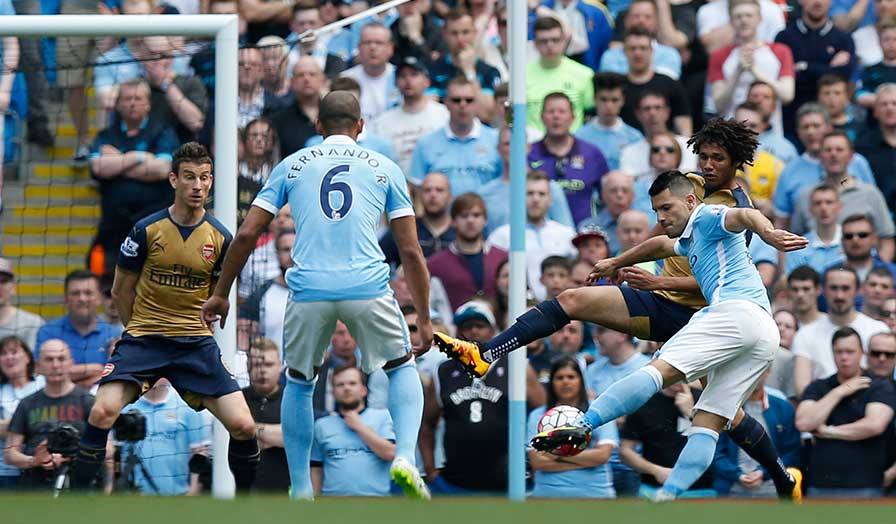Tactical Analysis | How Arsenal struggled without Coq-Ozil as man-marking took a backseat

Manuel Pellegrini's final home game did not go according to plans as Arsenal held them to a 2-2 draw, in a match where Manchester City dominated possession and created a host of chances. Arsenal missed the influence of Mesut Ozil and Francis Coquelin in the
How they started:
Manchester City (4-4-2): Joe Hart (GK); Bacary Sagna, Nicolas Otamendi, Eliaquim Mangala, Gael Clichy; Jesus Navas, Fernandinho, Fernando, Kevin de Bruyne; Kelechi Iheanacho, Sergio Aguero
Manuel Pellegrini, surprisingly, made just two changes to the team which took to the field in the second leg of their semifinal tie against Real Madrid. Iheanacho replaced Yaya Toure, who produced one of his most disappointing performance at Madrid last week. Mangala came into the starting lineup in place of the injured Vincent Kompany.
Along with a change in personnel, there was also a change in tactics. This was a must-win game for Man City in order to grab their place in the Champions League next season and Pellegrini opted for his more attacking 4-4-2 formation, instead of the 4-2-3-1.
Arsenal (4-2-3-1): Petr Cech (GK); Hector Bellerin, Gabriel Paulista, Laurent Koscielny, Nacho Monreal; Mohamed Elneny, Aaron Ramsey; Alexis Sanchez, Alex Iwobi, Danny Welbeck; Olivier Giroud
Arsenal
Iwobi
Man City overloading on the right
With Jesus Navas holding the width, Man City overloaded on their right wing with both Fernandinho, Aguero (and even Iheanacho at times) moving to that side of the pitch. With Sanchez, Arsenal's biggest threat in attack, playing on the other side of the pitch, Sagna was able to break forward to join the attack as well. They outnumbered Arsenal as Welbeck and Ramsey struggled to shield Monreal, who was put under immense pressure.


(Man City's average position in the first half)
So when Sergio Aguero put City into the lead in the eighth minute, there was no surprise that the goal arrived from their right wing. Jesus Navas, in particular, was in a confident mood as the Spaniard took on Monreal at every opportunity and even got past him a couple of times. The winger drilled in a host of crosses into the box and most of them arrived in the first half.

(Rampant Navas in the first half)
A night of missed man-marking at the Etihad
All the four goals that arrived during the match was caused by players failing to stay with the man, or space, they were supposed to be marking. The first goal arrived when Aaron Ramsey failed to track the run of Fernandinho into the box. With City overloading on the right flank, the Arsenal midfielders were required to help out their defenders.

Aguero kept Monreal busy, which allowed Navas to run at Welbeck. The Arsenal forward failed to stop Navas from crossing the ball, which picked out the run of Fernandinho inside the box. Ramsey failed to track his run, and that allowed the Brazilian to head the ball back to Aguero.

Monreal lost Aguero as well, and that opened up a lot of space for the Argentine inside the box, who easily skipped past Elneny and found the back of the net.
Arsenal's equalizer, few minutes later, arrived when Mangala failed to track Giroud's run during a corner and left the Frenchman with a free header. The trend continued when Bellerin lost out to de Bruyne and then let the former Chelsea man ran past him too
Arsenal's equalizer in the second half arrived when Fernando and Fernandinho lost Alexis Sanchez, who drifted in from the left wing after playing a one-two with Giroud. The Chilean exploited the space in front of the back-four, which was supposed to be protected by the duo.

Lack of Ozil, lack of chances
The German international's absence from the lineup meant that Arsenal did not have enough creativity in the final third of the pitch. The Gunners managed only one shot at goal in the first half and it arrived from the corner, which Giroud scored from. In the second half, they managed just four shots, which mostly came after Theo Walcott came on the pitch and finally Arsenal were able to get behind the Man City


(Couple of instances when Arsenal managed to get behind Man City through Walcott)
However, these two were the only three moments when Arsenal really stretched the Man City defence – the other being the moment when Sanchez scored.
Iwobi was played in the role Ozil operates in, and the youngster failed to have any significant impact on the match. Back in December when Arsenal defeated Man City 2-1, the match had similar settings. It

(Iwobi influence last night)
(Ozil's influence on the game when Arsenal defeated Man City)
Elneny and Ramsey – Not the right midfield combination
Since Arsenal's 1-1 draw against Crystal Palace, Arsene Wenger has used Aaron Ramsey and Mohamed Elneny in the midfield pivot, however, the duo are far too similar to play together in a 4-2-3-1 formation. While they got away with it against West Brom and Norwich, Man City exposed the defensive flaw this partnership has.
Sergio Aguero skipped past him too easily to score the opener, while Kevin de Bruyne ghosted past him to score his second goal. The 23-year-old's adventurous runs also caught him out of position on numerous occasions. This is exactly why Arsenal and Elneny need Francis Coquelin in the pivot – someone who prefers to sit back and shield the defence even when the others around him bomb forward in attack.
In the 53rd minute, all of the three central midfielders of Arsenal were caught out of position – Incredibly Elneny was the farthest man forward.

Arsenal lost the ball from this position and Manchester City hit them on the break. It was 2 on 3 at the back with none of Arsenal midfielders protecting the defence. However, thankfully for them, Iheanacho chose the wrong option in the final third and Arsenal escaped without conceding.

Comments
Sign up or log in to your account to leave comments and reactions
0 Comments